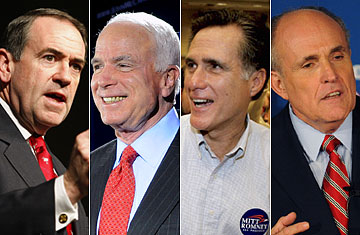
From left, Republican presidential candidates Mike Huckabee, John McCain, Mitt Romney and Rudy Giuliani
For as long as anyone can remember, Republicans have wired their presidential primary process in order to produce strong and unstoppable front-runners at a very early stage in the election calendar. But this year, all that intricate circuitry is going haywire.
Already, of course, the G.O.P. race has given new meaning to the term "up for grabs." After holding primaries and caucuses in six states, no clear front-runner has emerged. Mitt Romney has won three; John McCain has won two; Mike Huckabee has won one. If Rudy Giuliani, who has banked his entire campaign on a late entry in Florida, somehow prevails next week, Round 7 will only add to the confusion.
And then, at long last, comes the moment in the G.O.P. race — Super Tuesday, or Tsunami Tuesday, as it has been christened this year — that is supposed to winnow the field and bring some clarity.
But what if it doesn't? What if, as is suddenly becoming clear, the rules that were designed to produce a sturdy front-runner conspire to produce the opposite?
On February 5, primaries and caucuses in 21 states will award more than 1,000 delegates to the Republican National Convention — almost half of the amount needed to secure the nomination.
But a four-man field, in which each candidate has roughly the same momentum and factional strength (if not the same war chest), raises the distinct possibility that several candidates will split those delegates, postponing further the emergence of a front-runner. And that means the G.O.P. race could go on much longer than anyone imagined. It might even result in no candidate getting a majority of delegates when the primaries are over, a prospect that Republicans are starting to take very seriously.
Consider the 21 G.O.P. primaries and caucuses approaching fast on February 5. Of the group, 11 of the states are winner-take-all contests, meaning, in general, that whoever gets the most of votes in any given state gets all of that state's delegates. February 5 isn't just an effective national primary; it is supposed to work like a booster rocket to the nomination. Win big on February 5 and you never have to look back.
But that booster effect tends to work best when there are only one or two candidates in the race for the nomination. If three or four candidates are still in the fray on February 5, the arrangement could have the effect of further splintering the race rather than consolidating support for a winner.
The likelihood of a split decision is enhanced by several other factors:
First, so many big and expensive states are in play on February 5 that no single Republican contender has the cash to compete in them all. Which means every Republican is likely to concentrate his time and money on his five or six most favorable targets.
Second, regional identities could hasten the divide-and-conquer approach. Under this scenario, each candidate plays — for reasons of time, money and simplicity — to his geographical strength. That has happened in the past in big, multi-candidate, multi-state primaries. Given the nature of the field — one candidate from New York, another from the Southwest; a third from the heartland and a fourth who's got both cultural links to the intermountain West and a record in New England — it could well happen again.
As polls stand now — admittedly a useless indicator — the candidates are poised to split the spoils on February 5, even if we assume everyone contends for the trove of G.O.P. delegates at play in California, which is not a winner-take-all state. Let's imagine for a minute that Rudy Giuliani concentrates his efforts on four winner-take-all-states in his backyard: New York, New Jersey, Connecticut and Delaware. If he won those states and (for discussion's sake) one quarter of California's congressional districts, he would take home about 343 delegates.
Meanwhile, it's conceivable that John McCain would direct his efforts largely elsewhere, at Arizona, Colorado, North Dakota, West Virginia — as well as all of California. If he prevailed in those four states and won half of California's CDs, he could take home as many as 242 delegates.
Then, there are already signs that Mike Huckabee has his eye on a third set of states on Feb 5: the heartland arc of Arkansas, Georgia, Alabama, Missouri, Oklahoma and Tennessee. If Huckabee won all of those (and they are almost all winner-take-all states), he would take home a surprisingly large 308 delegates. (This assumes Fred Thompson retires from the field between now and then, and Huckabee does poorly in California.)
And Mitt Romney has a few cards to play on February 5, too. He ought to do well in Utah, Montana and Massachusetts. If he cornered one fourth of California's CDs as well he could add nearly 150 delegates to his tally. (Romney is ahead of the other Republicans in total delegates as things stand now; at the same time, Massachusetts is a proportional primary, meaning he'd likely not get all the delegates.)
Of course, things will surely turn out differently than the rough sketch above. And if this primary season has already taught us anything, it's that there's no way to predict how millions of voters will behave. "A big split probably won't happen," said a top delegate hunter for one of the G.O.P. candidates. "Momentum has always kicked in before. But the possibility is there this time like it has never been there before."
